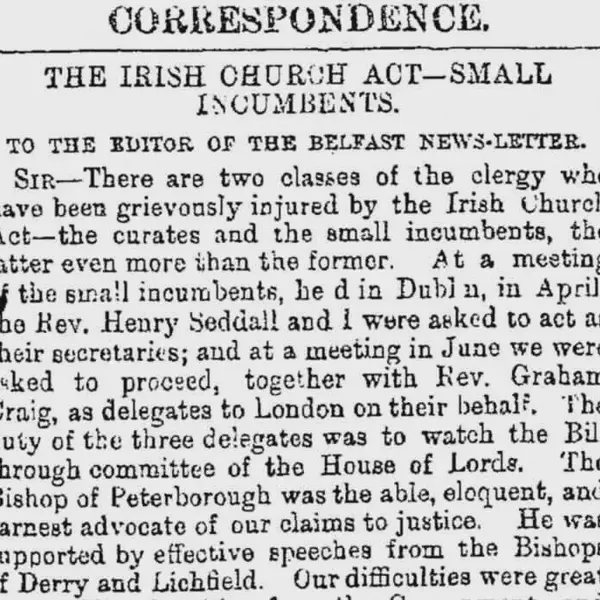
Gladstone's Irish Church Act Which Disestablishes the Church of Ireland Takes Effect
January 01, 1871
The “Irish Church Act” is often a reference to the Irish Church Act 1869, which was also known as the Disestablishment Act. It was a significant piece of legislation in the history of Ireland and the United Kingdom. The act was introduced by William Ewart Gladstone, a prominent British statesman and Prime Minister, and it led to the disestablishment of the Church of Ireland.
The Irish Church Act 1869 (32 & 33 Vict. c. 42) was an Act of the Parliament of the United Kingdom which separated the Church of Ireland from the Church of England and disestablished the former, a body that commanded the adherence of a small minority of the population of Ireland. The Act was passed during the first ministry of William Ewart Gladstone and came into force on 1 January 1871. It was strongly opposed by Conservatives in both houses of Parliament.
Key points about the Irish Church Act 1869:
Disestablishment of the Church of Ireland: The Irish Church Act aimed to disestablish the Church of Ireland, which was the Anglican Church in Ireland. Before this act, the Church of Ireland held a privileged position as the state church, and it was funded by the state. The act put an end to this official status.
Equality of Religions: The act was part of a broader movement toward religious equality and the separation of church and state. It recognized the rights and religious freedom of all denominations in Ireland, not just the Anglican Church.
Financial Arrangements: The act provided for the compensation of the clergy and the transfer of church property. Compensation was offered to clergy members affected by the disestablishment. Church lands and assets were also transferred from the Church of Ireland to the state.
Impact on Irish Society: The Irish Church Act was part of Gladstone’s efforts to address religious grievances in Ireland and promote a fairer and more inclusive society. It was seen as a significant reform in a country where the Anglican Church had been closely associated with the English and Protestant ascendancy.
Severing Ties with the British State: The act marked the end of the Anglican Church’s status as the state church in Ireland and signaled a significant step in Ireland’s journey toward greater political and religious independence from Britain.
Political Significance: The passage of the Irish Church Act contributed to a broader political realignment and was part of the context of debates around Irish Home Rule and greater self-governance for Ireland.
The Irish Church Act 1869 was a key moment in the history of Ireland and its relationship with Britain, as it signified a major change in the status of the established church and had broader implications for religious and political dynamics in Ireland.